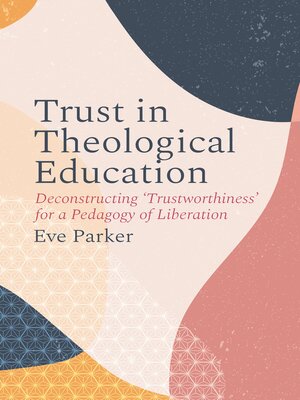Trust in Theological Education
ebook ∣ Deconstructing 'Trustworthiness' for a Pedagogy of Liberation
By Eve Parker

Sign up to save your library
With an OverDrive account, you can save your favorite libraries for at-a-glance information about availability. Find out more about OverDrive accounts.
Find this title in Libby, the library reading app by OverDrive.



Search for a digital library with this title
Title found at these libraries:
| Library Name | Distance |
|---|---|
| Loading... |
As those coming forward for ministerial training change and diversify, is the way we learn theology changing too? Integrity within our training institutions has often been assumed and granted to white, male, or those from the middle or upper classes. This has come at the expense of the faith truths, beliefs and perspectives offered by women, people of colour, indigenous theologies and the working classes, whose testimonies have often been ignored or marginalised by the dominant discourses that have been deemed more trustworthy as a consequence of the way in which imperialism has enabled knowledge and religion to be constructed and controlled. Yet theological education also has a potential to challenge these norms. It holds the potential to challenge oppressive cultures, theologies and pedagogies. Relying on feminist, black, indecent, and postcolonial theologies, Trust in Theological Education will deconstruct dominant models of theological education, by incorporating ethnographic research, alongside educational theory, liberation theology and radical exegesis'. It will demonstrate theological educations potential to change, and be transformed in order to enable those who have been excluded and marginalised to become speaking subjects and agents for systemic change.|As those coming forward for ministerial training change and diversify, is the way we learn theology changing too? Integrity within our training institutions has often been assumed and granted to white, male, or those from the middle or upper classes. This has come at the expense of the faith truths, beliefs and perspectives offered by women, people of colour, indigenous theologies and the working classes, whose testimonies have often been ignored or marginalised by the dominant discourses that have been deemed more trustworthy as a consequence of the way in which imperialism has enabled knowledge and religion to be constructed and controlled. Yet theological education also has a potential to challenge these norms. It holds the potential to challenge oppressive cultures, theologies and pedagogies. Relying on feminist, black, indecent, and postcolonial theologies, Trust in Theological Education will deconstruct dominant models of theological education, by incorporating ethnographic research, alongside educational theory, liberation theology and radical exegesis'. It will demonstrate theological educations potential to change, and be transformed in order to enable those who have been excluded and marginalised to become speaking subjects and agents for systemic change.







